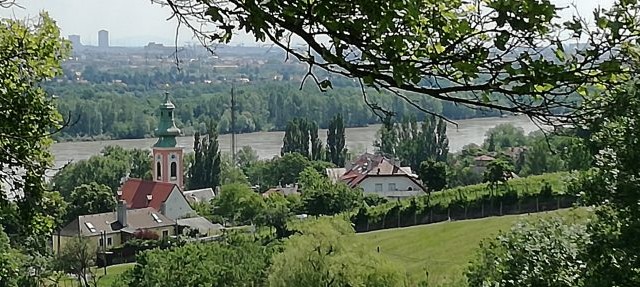Klimadörfl im Kahlenbergerdorf
Offer:
We currently have no places available and do not have a waiting list on which you can be placed.
The "Klimadörfl" association in Kahlenbergerdorf in Vienna is pursuing the goal of realizing the heating transition in a gas-supplied district and actively involving the residents in the process. The project is developing a blueprint for a climate-neutral neighborhood on the outskirts of the city, in which single-family homes and small apartment buildings dominate; fossil fuels are to be replaced by renewable alternatives and community solutions for energy supply are to be created.
The initiative is supported by the "Klimadörfl" association, which acts as a platform for cooperation between residents. The association enables the coordination and structuring of decision-making processes in order to ensure a stable and long-term heat transition. A consortium, whose legal form is yet to be determined, will be formed for the coordinated renovation of individual houses and the operation of private and communal facilities.
The community will be informed and actively involved in planning and decision-making through events, vision workshops and regular forum meetings. Various working groups (ARGEs) are dedicated to specific topics such as technology, organization, financing and communication. The ARGEs are responsible for their subject areas and are in direct contact with the residents, creating a local community that actively supports and promotes decarbonization. The use of digital tools such as Nextcloud facilitates collaboration and supports documentation.
At present, the focus is on community-organized but individually financed implementation projects.
Decarbonization requires considerable initial investment in the heating infrastructure, but this should be offset by reduced operating costs in the long term. Financial implementation is carried out using various models that are tailored to the individual needs and legal framework conditions of the owners. The options include
- Use of reserves: Existing reserves of the owners or owners' associations could be used for the measures.
- Use of subsidies: Decarbonization measures, in particular thermal refurbishment and conversion of the heat supply, are currently well subsidized.
- Contracting model: An external energy service provider takes over the financing and operation of the system, and the building owners pay for the energy supply via long-term installments.
An economically sustainable financing model is crucial in order to make decarbonization attractive and affordable for residents and owners. An initial life cycle cost analysis has already been carried out and showed positive effects of the measures on long-term energy costs compared to continued gas supply. However, decision-making is influenced by aspects such as ownership structure and funding, and active consultation with building owners is a key part of the project strategy.
In Kahlenbergerdorf, decarbonization is being driven forward through the establishment of a heat-energy community in which various building owners (private owners, Klosterneuburg Abbey, Wiener Wohnen, Via Donau,...)
to implement a renewable heat supply. One of the main objectives was to set up an anergy network for the use of geothermal energy through geothermal probes, which are to be installed in the parish garden of the Kahlenbergerdorf. In addition, the use of solar energy through PV and PVT collectors is being investigated in order to support the heating network and thermally regenerate the geothermal probes.
The technical implementation is supported by individual measures in the buildings. These include heat pumps to supply individual apartments or entire houses, heat storage tanks and suitable insulation measures. The design of the technical components is based on a detailed analysis of the buildings using GIS data and simulations. These measures are intended to gradually replace the existing gas-based heating supply and thus reduce dependence on fossil fuels.
When evaluating different options, it was determined that it would be cheaper to convert the heating system individually; implementing a local heating network would be too expensive due to the age of the buildings, which often do not have a basement. Nevertheless, the technical implementation of individual measures in the individual properties should be coordinated in order to achieve synergy effects, learn from each other, motivate each other and ultimately save costs.

Contact
None, Vienna, Vienna 19.
Profile
Energy project, founded by None.
Legal form: diverse
Organizational form: Energy community
Characteristics
See also
Posts tagged klimadorfl-im-kahlenbergerdorf
Mediacredits
no

